Subscribe to Our Newsletter
Stay updated with the latest tips and strategies. Get additional discounts and alerts on offers.

Ad campaigns have the power to make or break a brand’s success. They are at the heart of strategic marketing, capable of bringing a brand into the spotlight or leaving it unnoticed.
Ad campaigns can elevate a brand from ordinary to extraordinary—setting benchmarks that resonate across audiences and industries. Discover the core elements, groundbreaking strategies, and emerging trends that make the world’s most iconic ad campaigns unforgettable and future focused.

An ad campaign is a series of advertisements revolving around a central message designed to achieve specific business goals.
These campaigns focus on:
Building brand awareness for a new product or service.
Driving sales by targeting potential customers.
Generating leads that convert into long-term growth.
These campaigns are crafted to deliver measurable results while engaging the target audience effectively. Did you know? A well-executed ad campaign can boost sales by as much as 300% when aligned with customer needs.
The most memorable ad campaigns do more than just promote products—they shape public perception, drive cultural change, and profoundly impact consumers and industries. These campaigns capture attention, spark conversations, and elevate brands to new heights of recognition and influence.
What sets these campaigns apart?
They consistently exhibit four key qualities that lead to extraordinary success:
These campaigns create a solid emotional connection with their audience by aligning with cultural movements or societal values.
Partnering with celebrities boosts brand trust, expands reach, and creates a strong, positive connection with consumers.
Let’s explore the top 5 ad campaigns that revolutionized advertising, exploring the innovative strategies that turned them into global icons and set standards in the marketing world.”
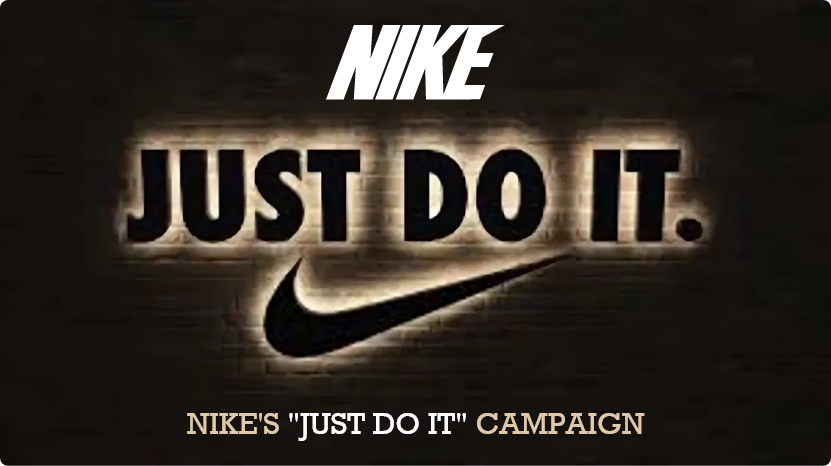
In 1988, Nike was a rising star in the sportswear industry, eager to differentiate itself from competitors. Nike partnered with the renowned advertising agency Wieden+Kennedy to launch a campaign that would transform it into a global leader.
Nike’s “Just Do It” campaign went beyond selling products – it became a global movement, inspiring empowerment and motivating millions to exceed their limits. It transformed Nike into a symbol of determination and achievement.
The campaign used 3 main strategies; they are:
1. Universal Appeal: The campaign resonated with athletes, fitness enthusiasts, and everyday consumers, creating an inclusive message that anyone could relate to.
2. Emotional Power: By tapping into universal themes of self-empowerment, Nike connected emotionally with audiences, regardless of age or sport.
3. Multimedia Impact: Combining compelling visuals with powerful soundtracks and voiceovers amplified the emotional impact, making the ads unforgettable.
Nike’s “Just Do It” campaign didn’t just elevate the brand but set a new advertising excellence standard. This iconic campaign transformed how brands connect with consumers and redefined the power of storytelling in marketing.
Here are the key takeaways that made the campaign unforgettable and a game-changer in the advertising world:
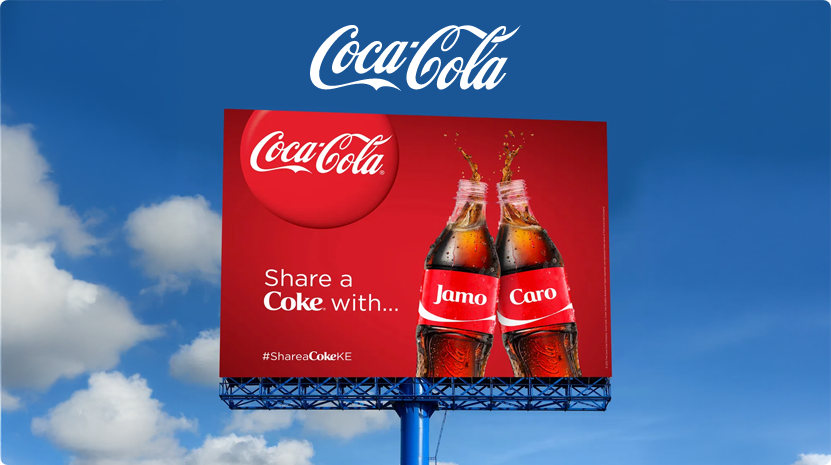
In 2011, Coca-Cola launched the “Share a Coke” campaign to build a more personal and engaging connection between the brand and its consumers.
The campaign replaced Coca-Cola’s iconic logo on bottles and cans with popular individual names, encouraging consumers to find and share bottles featuring their names or the names of friends, family, and loved ones. This simple yet powerful gesture fostered a sense of community and happiness, strengthening the emotional bond between the brand and its audience.
The “Share a Coke” campaign is a prime example of experiential marketing. It combined traditional advertising with interactive consumer engagement. The campaign went beyond just putting names on bottles. It transformed the entire brand experience. Over 500,000 photos were shared with the #ShareaCoke hashtag on social media. Through the seamless integration of digital marketing with offline experiences, Coca-Cola achieved widespread brand awareness and consumer engagement.
Let’s dive into the three key strategies that made this campaign a success:”
1. Storytelling: Personalized bottles created a strong emotional bond with consumers, motivating them to share experiences with friends and family, which enhanced the sense of connection and engagement with the brand.
2. Digital Engagement: The campaign’s interactive aspect expanded its reach, turning everyday consumers into brand ambassadors. This seamless integration between offline and online engagement fostered a broader connection with the audience.
3. Call-to-Action: The direct call to action of “Share a Coke” drove social media engagement, increased sales, and contributed to the campaign’s viral success.
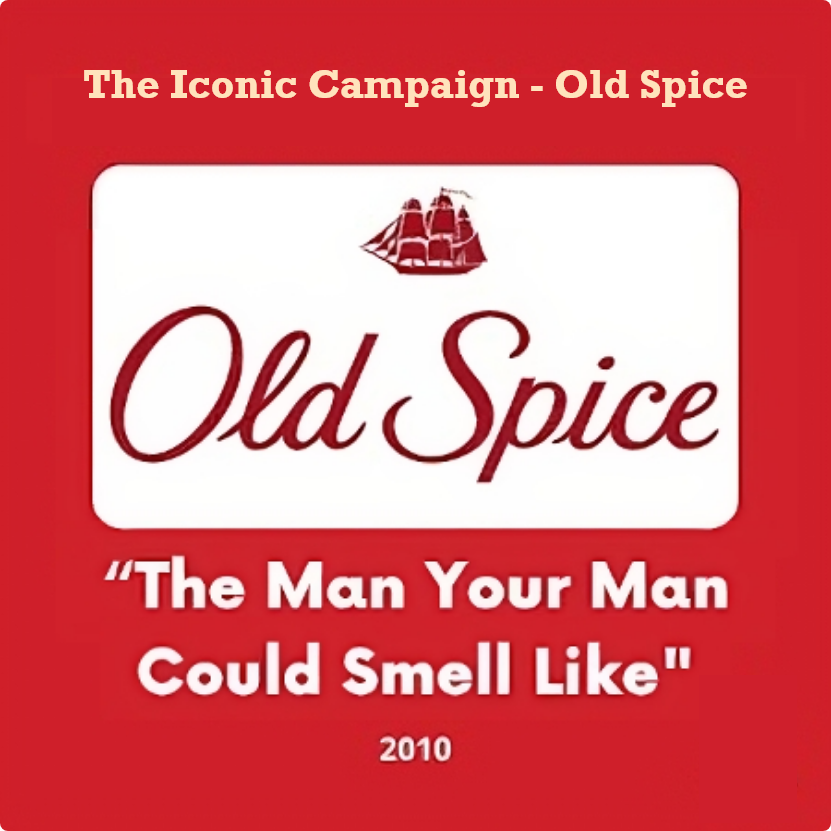
In 2010, Old Spice launched its “The Man Your Man Could Smell Like” ad campaign to revitalize its brand and shift its image from outdated to modern. Traditionally associated with older generations and considered old-fashioned, Old Spice faced the challenge of attracting a younger, trendier audience.
To overcome this, the brand strategically repositioned itself to engage a new demographic—millennials and Gen Z—making it one of the most successful brand reinvention campaigns in advertising history.
The Old Spice ad campaign successfully transformed the brand’s image and established it as a leader in the highly competitive men’s grooming market. By rebranding and targeting a younger, trend-conscious demographic, the campaign became one of the decade’s most influential advertising success stories.
This victory can be attributed to three key strategies
1. Engagement: Captivating Audiences: The campaign captivated viewers and fostered an emotional connection, making the brand more relatable. This strategic approach boosted brand recall, increased audience interaction, and encouraged deeper consumer involvement, driving greater brand loyalty and awareness.
2. Viral Marketing: Engaging Audiences with Follow-up Ads: The brand effectively leveraged viral marketing by creating a series of follow-up ads. It kept the conversation alive, encouraged sharing, and expanded the campaign’s reach, generating more buzz and interaction.
3. Strong Brand Identity: More Than Just a Product: The campaign crafted a powerful brand identity by positioning the product as a symbol of masculinity, confidence, and luxury. It transformed the offering into a lifestyle choice, creating a lasting impression on its audience.
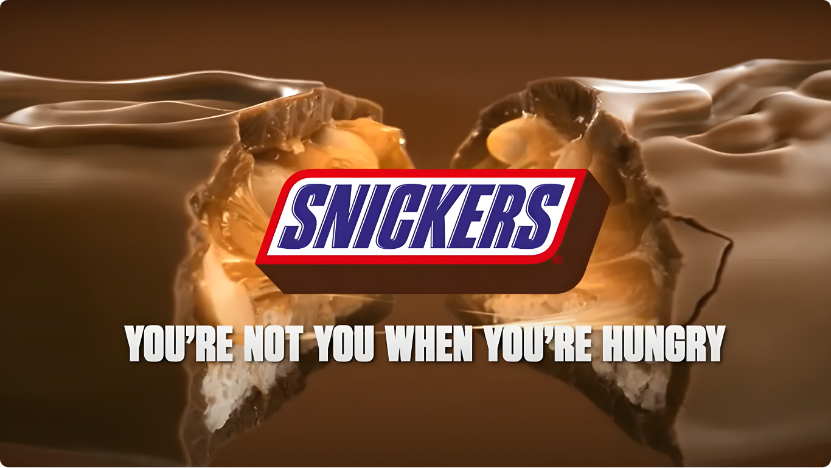
In 2010, Snickers, a well-established peanut butter candy bar, faced the challenge of declining market share and struggled to differentiate itself in a highly competitive market.
The brand recognized the universal truth that hunger can drastically alter personality, making people irritable and out of character. This insight sparked the idea for a revolutionary advertising campaign that dramatically transformed Snickers’ brand image and reignited consumer interest.
The Snickers ad campaign shifted the brand’s perception, positioning Snickers not just as a regular candy bar but as a functional snack that boosts mood and enhances performance.
This clever rebranding helped Snickers stand out in a crowded market, emphasizing its unique value as a hunger-satisfying snack that provides instant energy.
The campaign’s success can be attributed to two key strategies:
1. Value Proposition: The campaign clearly communicated the benefits of Snickers—satisfying hunger and restoring energy levels. This approach helped consumers see the candy bar as a functional snack rather than just a treat.
2. Relatability: Matching a universal human truth that hunger can change a person’s mood and behavior with a brand truth, the campaign created a strong emotional connection with consumers. This relatability made the ad memorable and powerful, resonating deeply with viewers.
3. Brand Consistency: Snickers has built strong brand recognition with its consistent “You’re Not You When You’re Hungry” message, making it the go-to snack for quick hunger relief.
The campaign shifted the brand’s marketing strategy by highlighting the connection between hunger and behavior in a fun and memorable way. Instead of focusing solely on the product, it cleverly used humor and relatable scenarios.
This approach engaged consumers and positioned Snickers as a quick energy boost. It also emphasizes that Snickers satisfies hunger and restores balance to a person’s mood and energy levels.
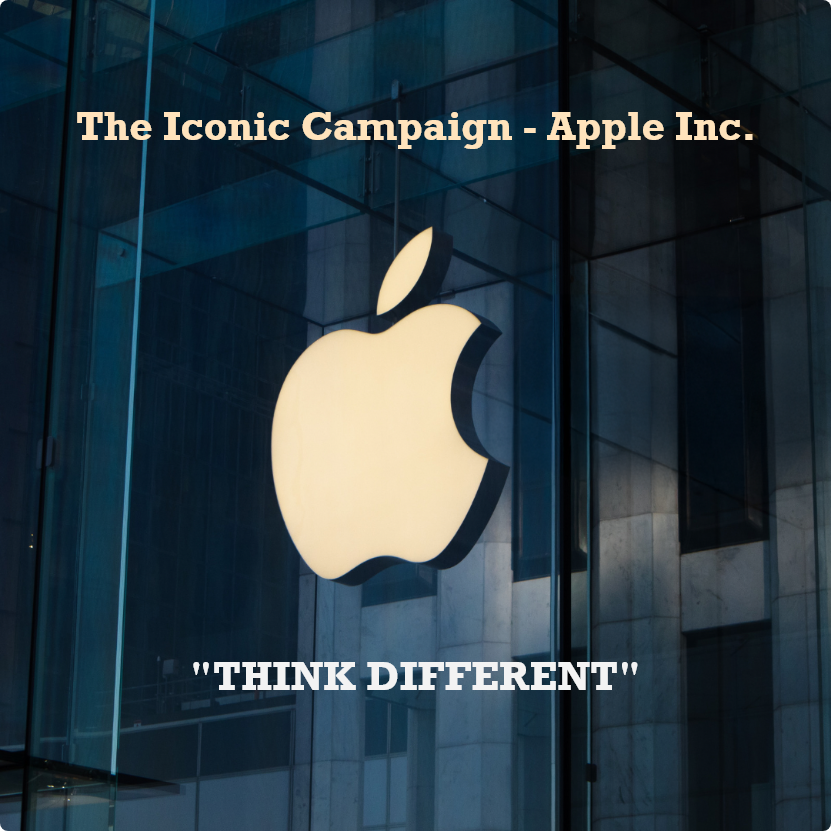
In 1997, Apple launched its iconic “Think Different” campaign to distinguish itself amid fierce competition, particularly with Microsoft. The campaign celebrated innovators, dreamers, and rebels who dared to challenge the status quo.
The campaign featured legendary figures such as Albert Einstein, Martin Luther King Jr., and Mahatma Gandhi, who changed the world through unconventional thinking. Apple’s message was clear—it wasn’t just selling computers but inviting customers to be part of a movement of creativity and innovation
Steve Jobs embarked on a mission to revitalize Apple. He recognized the need for a radical shift in the company’s marketing strategy. He developed a campaign that would capture the essence of Apple’s ethos while inspiring consumers to think differently.
The campaign’s success can be attributed to three key strategies:
1. Emotional Resonance
The campaign tapped into universal human emotions, such as inspiration, to build a deep emotional connection with consumers. This powerful emotional appeal made the brand relatable and memorable.
2. Compelling Brand Narration
Apple created visually stunning imagery and crafted compelling narratives that showcased the brand’s innovative spirit and left a lasting impression, reinforcing its premium brand experience.
3. Legacy and Impact
The “Think Different” campaign left a legacy that continues to shape consumer perceptions of Apple. It inspired a culture of creativity and innovation.
The consistent use of the “Think Different” slogan and imagery across multiple channels helped build consumer trust and strengthen the brand’s credibility. Consistent branding reinforces brand identity and fosters consumer loyalty.
As marketing continues to evolve, cutting-edge technologies and innovative strategies will drive the future of advertising, engaging and captivating audiences on a deeper level than ever before. Staying informed about the emerging trends that will shape the advertising landscape is essential to staying ahead of the curve and maintaining your brand’s relevance.
Let’s explore the trends set to redefine the advertising industry and why staying updated on these shifts is crucial for success.
In today’s AI-driven marketing landscape, advertising is rapidly evolving with innovations like Artificial Intelligence (AI), Augmented Reality (AR), Virtual Reality (VR), and gamification. These cutting-edge technologies reshape how brands engage and connect with audiences, creating immersive, personalized experiences beyond traditional storytelling.
By leveraging these advancements, brands can craft more profound, meaningful experiences that resonate with consumers and drive brand loyalty.
Leverage AI technology to deliver real-time, personalized ad experiences that cater to individual preferences, such as tailored product suggestions or location-specific offers.
Example:
Dynamic ads that adapt visuals and messaging based on a viewer’s local weather, season, or cultural context, creating a more personalized and relevant connection.
Utilize augmented and virtual reality to offer interactive experiences that engage users and create lasting, memorable brand connections.
Example:
A sustainable fashion brand uses VR to let users explore eco-friendly fashion choices versus fast fashion, dynamically changing the virtual world based on their decisions and highlighting the real-world impact.
Foster brand loyalty by engaging consumers through campaigns encouraging participation and creating a sense of community around shared values.
Example:
A fitness brand motivates users to share their milestones, cultivating a supportive, engaged community where everyone feels empowered to achieve their goals.
Incorporate gamification into ad campaigns to captivate users by allowing them to interact with the story and influence its outcome.
Example:
A car brand offers an interactive platform where users design their perfect road trip, discovering and exploring features of their vehicle through the experience.
Develop campaigns that span multiple platforms, ensuring each piece of content builds on the previous one to create a unified, engaging story.
Example:
A mystery-themed campaign starts with social media teasers, continues through email newsletters, and concludes with a dynamic AR experience, drawing customers into an ongoing narrative.
Collaborate with non-profits or social causes to create emotionally resonant campaigns that align with your brand’s values and have a positive societal impact.
Example:
A footwear brand pledges to plant a tree for every pair sold and involves customers in the planning process, connecting them with the cause and fostering brand advocacy.
Incorporate live streaming and brief content to create a sense of urgency and authenticity, enhancing real-time engagement with your audience.
Example:
Brands host live product launches, behind-the-scenes looks, or Q&A sessions with customers, creating a genuine connection that strengthens trust and loyalty.
In this blog, we’ve explored the essence behind successful ad campaigns, highlighted the unforgettable strategies that made them stand out, and examined how each campaign carved a unique place in advertising history.
Additionally, we discussed emerging trends that will shape the future of advertising. These insights will equip you to create ad campaigns that are not only successful but also impactful. Take these strategies and insights to build campaigns that leave a lasting impression and drive real, meaningful action.
The success of iconic ad campaigns lies in strategic planning—especially understanding your target audience. The ability to segment, personalize, and deliver tailored messages at the right moment is the key to their success.
At DataCaptive, we provide comprehensive B2B databases that empower your marketing team to design highly targeted ad campaigns. With access to detailed company profiles, decision-maker contact information, and industry-specific insights, you can tailor your campaigns for maximum relevance—just like the brands featured in these case studies.
Get a Quote!
Show Some Love!

Subscribe to Our Newsletter
Stay updated with the latest tips and strategies. Get additional discounts and alerts on offers.
Related Articles
Subscribe to Newsletter
Stay up to date with the latest marketing, sales, and service tips and news.
Share your requirements, and we’ll provide a tailored list to maximize your impact with the right contacts!

FILL IN YOUR DETAILS TO REQUEST A CALLBACK
You may also be interested in:
Access accurate personal emails and direct numbers for improved outreach.
